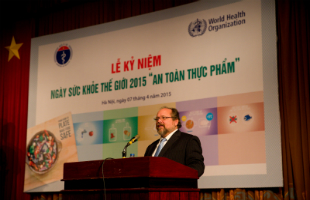
Dr Nguyen Thanh Phong, Director-General Viet Nam Food Administration,
Distinguished guests,
Ladies and gentlemen,
I am very pleased to be here today to address the World Health Day celebration in Viet Nam.
The theme for this year is “Make Food Safe, from Farm to Plate”. This is in recognition of the high importance of food safety and it serves as a call, once again, to all governments, farmers, manufacturers, retailers and the public to share responsibility in ensuring that all food is safe to eat.
Globally, around 2 million lives are lost to diseases caused by unsafe food. Harmful microorganisms, toxins and chemical substances cause more than 200 diseases ranging from diarrhoea to cancer. Unsafe food contributes to the vicious cycle of disease, malnutrition and poverty.
Food safety is a global public health issue. Over the years we have seen that the harmful effects of unsafe food are far-reaching crossing borders and affecting millions of people globally. One example is the contamination of melamine in milk that has affected millions of people and has put to risk many other food products globally.
In Viet Nam, we have also seen similar problems. In 2011, government inspectors found a number of products manufactured in Viet Nam that contain high levels of the red dye, Rhodamine B which is carcinogenic to humans. In 2014, the Viet Nam Food Administration reported 194 food poisoning outbreaks affecting over 5000 people, of whom 80% were hospitalized and 43 died.
The issues along the food chain are wide and complex- from the cleanliness and sanitary conditions needed in the preparation of a bowl of Pho to the level of harmful chemicals in processed food.
In addition, there is one serious emerging issue that I would like to mention: Antibiotics in the food chain.
The use of antibiotics in animals is raising concerns domestically and internationally. Research shows that 75% of antibiotics consumed in Viet Nam are used in agriculture. Alarming levels of antibiotics in meat and fishery have been detected. This issue requires urgent, high-level multi sectoral action. We cannot afford antimicrobial resistance slip through products that are consumed by people every day.
On the side of development, food safety is becoming much more significant to Viet Nam as the country continuous to grow. Viet Nam is increasingly becoming a significant player in the global food value chain. Viet Nam has been ranked as the most rapidly growing-fast-moving consumer goods consumption country in Asia.
The channels for food distribution are also becoming much more diverse. The coverage and complexity of the distribution channels and the food chain necessitates a systematic and well- coordinated regulation, from farm to plate.
Strengthening of the national regulatory mechanisms is fundamental to food safety. The entry into force of the revised Food Safety Law in 2011 was an important step in the right direction. Along with this, the government has also strengthened its capacity to detect and respond to foodborne outbreaks the International Health Regulations (2015) and INFOSAN.
The World Health Organization stands committed to continue to support Viet Nam in this process.
The behaviour of every individual along food chain is at the heart of promoting and ensuring food safety. Each and every one of us can take five simple actions to prevent foodborne diseases:
- Keep clean – wash hands properly and keep the surfaces to produce food clean;
- Separate raw and cooked foods;
- Cook food thoroughly, especially meat, poultry, eggs;
- Keep food at safe temperatures; and
- Use safe water and raw materials when preparing food.
These measures -WHO’s Five Keys to Safer Food- do not need enormous resources but dedication and commitment from both government, stakeholders and the public. Meanwhile we urge the government to continue to be vigilant in its oversight and in the enforcement of its regulations. Food is vital and basic to human existence – and it is our collective duty to make it safe at all times.
